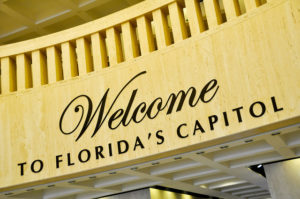New Beer Bill Would Drastically Change Florida Brewery Taprooms – FL HB: 1329
On the eve of the 2014 Florida Legislative session, Representative Ray Rodriguez introduced House Bill 1329, which proposes big changes for the operation of Florida breweries. The stated purpose of HB 1329 is to authorize a “very limited exception to the three-tier system” by allowing breweries to sell their beer in growlers. While the bill does authorize growlers (in two sizes), it also imposes strict requirements on the operation of existing brewery taprooms and ensures that new brewery taprooms will never operate in the same way.
Different Rules for Taprooms Old and New
House Bill 1329 divides Florida’s production breweries into two categories: production breweries licensed before July 1, 2014 and production breweries licensed July 1, 2014 or later.
Legacy breweries–those licensed before July 1, 2014–could continue to operate taprooms under the existing tourism exemption so long as they continue to meet new requirements. The tourism exemption currently allows Florida breweries to operate a taproom where a brewery’s own beer and guest beers and wine can be served for consumption on premises or carry-out for consumption off premises (more on the tourism exemption in Brewers’ Law 101: Florida Brewing Licenses). Under HB 1329 existing taprooms could continue to operate this way as long as:
- There is no change in the brewery’s ownership;
- There is no change in the brewery’s location;
- There is no change in the brewery’s licenses;
- The brewery or the taproom is not closed for more than 30 days; and
- The brewery’s beer is available for distribution or exportation without interruption for longer than 60 days.
While legacy breweries are initially grandfathered-in under the proposed law, it is likely that many legacy breweries would lose this status over time.
At immediate risk are many of Florida’s newest breweries, which are not yet grown to the point where it is in their best fiscal interest to distribute their beer. They would no longer be able to only rely on taproom sales. Even more established breweries would likely lose their grandfathered status due to changes in ownership, renovations, or expansions.
The taprooms of new breweries–those licensed July 1, 2014 or later–would look greatly different under HB 1329. The proposed law would authorize a new type of license for the operation of these redefined taprooms. The taproom of a new brewery would be permitted to sell, for consumption on premises or growler carry-out, only its own beer. Guest beers would not be allowed in new taprooms. In addition, new breweries would have to pledge their intention to distribute the beer they manufacture. New breweries could only sell the same beer in their taprooms that they make available for distribution. As a result, special or experimental in-house brews will be forbidden. HB 1329 specifically prohibits collaboration beers for sale in new brewery taprooms.
For most breweries, a substantial portion of revenues comes through the taprooms. Should HB 1329 pass into law, the changes that would affect taprooms at both legacy breweries and new breweries would likely impact the bottom lines and growth strategies of breweries that rely heavily on sale through their taprooms.
House Bill 1329 does not contain any substantive changes concerning the operation of brewpubs.
64 Ounces of Regulations
House Bill 1329 also authorizes growlers and provides specific rules about filling and selling them. Growlers are permitted in two sizes only–32 ounces and 64 ounces. Growlers would have to be appropriately labeled with the brewery, brand, type of beer, volume, and alcoholic content. Growlers would have to have tamper-resistant seals. Rules concerning the filling of growlers would be determined by each county or city.
Breweries would be allowed to fill growlers only with their own beer. Package stores and full liquor bars would be permitted to fill growlers with any beer. Mail-order growlers and growler delivery services are prohibited.
Will House Bill 1329 Pass Into Law?
I don’t know. It’s not as far along in the process as the prior beer bills being consider this session. The growler and tastings bills–SB 406 and HB 283–and the tastings only bills–SB 470 and HB 387–have all got unanimous votes from their principal committees in the House and Senate (more on these bills in Beer Bills Pending for 2014 Florida Legislative Session). For HB 1329, there is no companion bill in the Florida Senate. A competing bill in the House, House Bill 7075, has also been introduced and provides drastically different, and seemingly more favorable, regulations for brewery taprooms (more on HB 7075 to come).
If HB 1329 does pass into law, it would become effective October 1, 2014. Whether the bill passes or not, it is a clear indicator of what some members of the beverage industry and their legislative supporters envision for the future of Florida breweries.


